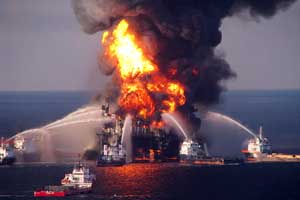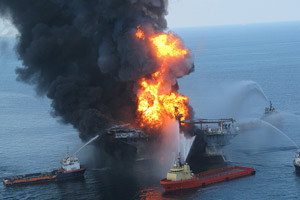The National Oil Spill Commission released a chapter of its final report on the Deepwater Horizon oil spill on Wednesday night. The report directed much of the blame for the incident at BP, Halliburton, and Transocean, the three companies directly involved in the drilling at the time of the explosion. But the report also makes it clear that there were broader failures—in the industry and government oversight—that precipitated the disaster.
And that was just one chapter of the report; the rest is expected to outline more broadly the causes of the disaster and the advisable reforms to avert a similar catastrophe in the future. But those who opposed the temporary drilling moratorium that the Obama administration put in place (and later lifted) are using the report to claim that the pause on drilling to assess safety was not necessary. Here’s Sen. Mary Landrieu (D-La.) calling the time-out “excessive, over-reactive and uncalled for,” among other things:
These findings seem to support what we’ve said all along: that the blowout was caused mainly by human error among the companies managing and servicing that particular rig, not by any faulty mechanical system or equipment failure. The administration’s response to this tragedy—to impose a moratorium on all other deepwater drilling in the Gulf—was excessive, over-reactive and uncalled for, in much the same way as if the government were to ground all commercial flights pending investigation of a single plane crash. Nothing in these findings justifies the shutdown of an entire industry because of one mishap. I eagerly look forward to reading the Commission’s full report.
That’s really not what the chapter says at all. Actually, here’s exactly what it says:
The blowout was not the product of a series of aberrational decisions made by rogue industry or government officials that could not have been anticipated or expected to occur again. Rather, the root causes are systemic and, absent significant reform in both industry practices and government policies, might well recur.






